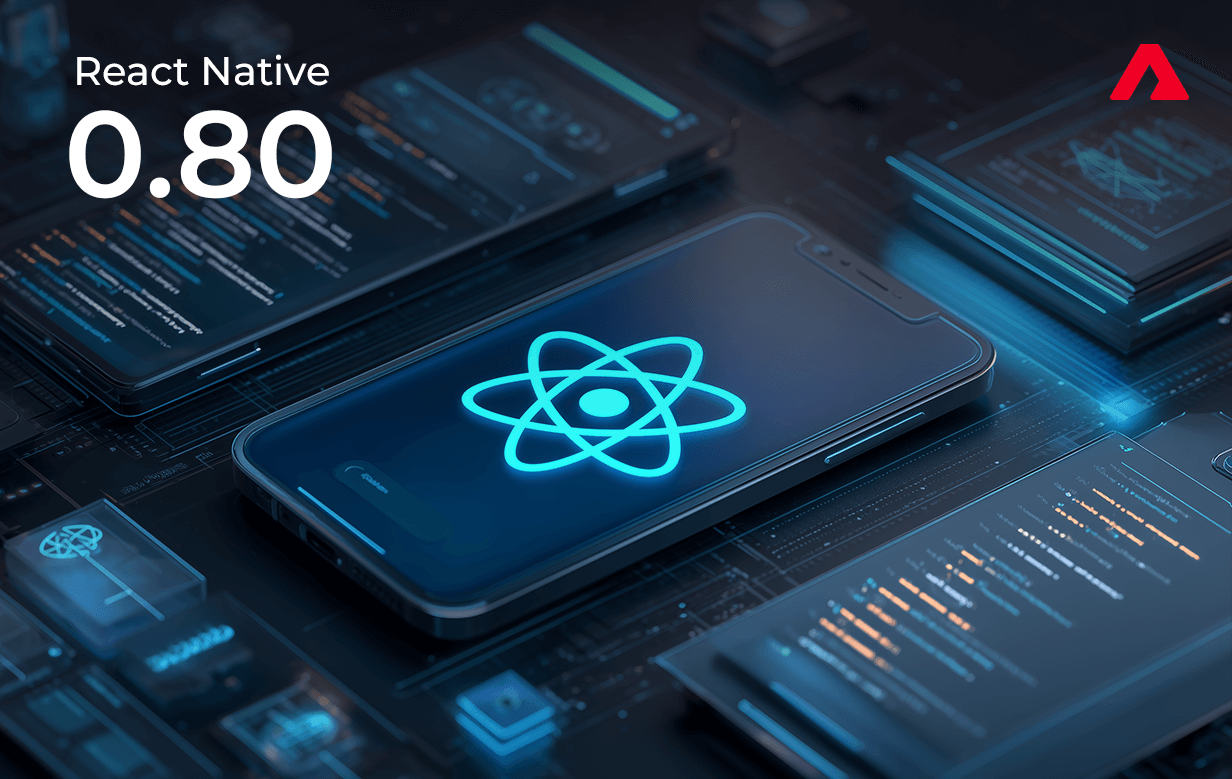React Native 0.80 was just released on June 12, 2025, representing a significant update with major improvements. This release is setting new standards for performance and functionality with faster iOS builds and smaller Android APKs. Moreover, it integrates with React 19.1.0 and freezes the legacy architecture and introducing an opt-in Strict TypeScript API.
The legacy architecture is officially frozen for React Native now, and APIs will stop working for outdated systems. Ever since this versioned release, it has demonstrated its capabilities, from performance boost to architecture cleanup, and also proved that it is designed to elevate your mobile stack with unmatched speed and stability.
This blog will highlight key updates you should know about.
Key Highlights of React Native 0.80
1. JavaScript deep imports deprecation
The formal deep imports deprecation aims to reduce the total surface area of the API and stabilize React Native’s public JS API. This focuses on limiting what developers can import from the React Native package to a fixed set of stable exports so that the API can be predictable and maintainable. ESLint will flag and warn for specific import patterns from a subpath and will suggest migrating to the root import.
// Before - import from subpath
import {Alert} from 'react-native/Libraries/Alert/Alert';
// After - import from `react-native`
import {Alert} from 'react-native';
2. opt-in Strict TypeScript API
An introduction of opt-in Strict Typescript API is a highlighted feature in React Native 0.80 and eventually might become the default. You can directly generate these types from React Native’s source code, leading to enhanced accuracy and correctness.
React native defines a more rigid public API and prevents breaking changes from internal modifications because strict types are restricted to the index.js or index file. However, you can enable it via compilerOptions in the project’s tsconfig.json file. Additionally, strict TypeScript API within React Native acts as a preview of the future stable JS API and is recommended for early adopters for accuracy and stability.
3. Legacy Architecture Freezing & Warnings
The Legacy Architecture of React Native is officially frozen. Which means that no new features, fixes, or tests will be added to the old systems, and DevTools will flag warnings on any usage of deprecated APIs. The sunset of the Legacy architecture will lead to significant improvements, including regression mitigation, improved runtime, reduced app size, and better codebase maintenance.
4. React 19.1.0 Integration
React native 0.80 now runs with React 19.1.0, and most importantly, its owner stack will help you identify errors in the actual components. Although this integration supports updates and bug fixes from the React ecosystem, but still struggles with owner stack and does not work as expected in React Native with @babel/plugin-transform-function-name Babel plugin. However, the fix is in progress for a future React Native release.
5. Experimental Prebuild for iOS
The initial build time for a React native app was a challenge for developers, particularly if projects grow in complexity. An experimental prebuild in React Native 0.80 enables the use of prebuilt 3rd-party dependencies and results in up to 12% faster development. Additionally, Meta is introducing precompiled React Native Dependencies for libraries like Folly and GLog.
6. Smaller APK for Android
This update aims to deliver unmatchable performance and efficiency, enabling Interprocedural Optimization. The Android APK size built with React Native 0.80 will be reduced by 1MB, which makes the app lighter and quicker to download and install.
7. Other significant updates
-
New App Screen Redesign:
If you rely on Community CLI instead of Expo, you will notice that the “New App Screen” is now its own package with a fresh design. This leads to a clean-up of boilerplate so that you can start a new project fast and clutter-free. It also provides a seamless experience for bigger screens of laptops, tablets, and desktops.
-
JSC Community Support Notice
React Native 0.80 will be the last version to include built-in support for JSC because it is switching to Hermes. In future versions, if you want to use JSC, you will need to install it separately through a community-managed package called @react-native-community/javascriptcore.
-
Exports on the main package
React native 0.80 has added “exports” in its package.json file to better organize code as part of the JavaScript API improvements. This field defines exactly which parts of the package can be accessed. For now, everything will work the same, except the way some modules are loaded might change slightly. Overall, it’s a behind-the-scenes change that may require minor adjustments.
A quick guide for a smooth upgrade to the 0.80 version
React Native 0.80 brings powerful improvements and is considered a great choice for early adopters. However, it is not just a version bump; upgrading to 0.80 requires careful consideration, especially if you are using Legacy Architecture.
Here are some practical steps to ensure a smooth upgrade:
1. Start with the Changelog
A successful upgrade starts with comprehending what has changed. Carefully review and pay attention to the changelog and look for deprecations, breaking changes, and migration tips. In particular, watch out for:
- Deprecated deep imports
- The new Strict TypeScript API (if you plan to opt in)
- The freeze on Legacy Architecture support
2. Update Your Dependencies
Make sure your current libraries and native modules are compatible with 0.80. Start by updating the key packages:
- react-native to 0.80
- react to 19.1.0
- Tools like Metro, Flipper, and other core dependencies
Also, check for updates to popular third-party libraries like navigation, gesture handlers, or camera modules.
3. Replace Deep Imports
If your code includes paths like react-native/Libraries/…, then you can clean them up. Switch to official top-level imports because ESLint will now flag these old paths, and future versions will remove them completely.
4. Opt into the StrictTypeScript API
It’s a good time for you to consider enabling the new Strict TypeScript API for stronger type safety and tooling support. For that, you will need to update your tsconfig.json and make some small tweaks in your code due to changes in how some types are named or structured.
5. Explore New Architecture Support
It’s worth checking and getting familiar with the New Architecture, even if you are seasoned with Legacy Architecture. This switch will unlock tools like Fabric and TurboModules, known for their performance and smoother animations.
6. Clean and Rebuild Everything
Now it’s time for the final cleanup of the project and preventing it from bugs and outdated caches. Consider using a tool like npx react-native-clean-project or manually delete node_modules, ios/Pods, .gradle, and any other build folders. Finally, reinstall your dependencies and do a fresh build to ensure everything works as expected.
7. Check Build Size and Performance
This is the final step you have to follow once the upgrade is completed. React native 0.80 introduces capabilities like iOS prebuilding and Android build optimizations for faster builds and smarter app bundles. Check how your app’s build size and compile time are affected; you should see noticeable improvements.
Conclusion
React Native 0.80 is setting a new standard for cross-platform mobile development. This update focuses on improving the framework. It offers faster iOS builds, smaller Android APKs, and introduces the Strict TypeScript API. Upgrading requires careful planning and technical skills. This is especially true if you’re moving from deep imports or the Legacy Architecture.
At Atharva System, we help businesses stay ahead by adopting the latest tools and frameworks with confidence. If you’re planning to upgrade your app or start a new project with React Native 0.80, our React Native App Development Services team can help. We guide you through each step, from code audits and migration to performance tuning and setting up the architecture.
Ready to future-proof your mobile app with React Native 0.80?
Contact us at [email protected]
Visit us at https://www.atharvasystem.com to learn more.




































